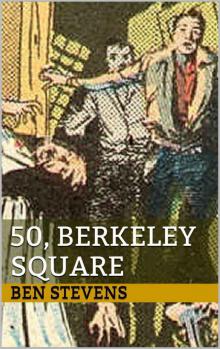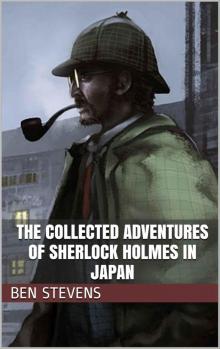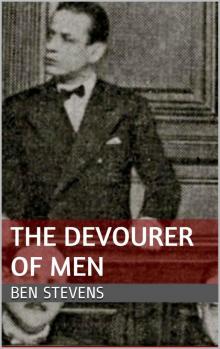- Home
- Ben Stevens
Silent Screaming Face
Silent Screaming Face Read online
Silent Screaming Face
A story that borrows a small segment of the plot from the movie ‘The Fly’.
George Wilhelm Vanderbilt swore viciously, as the ceiling lights flickered for several seconds before blazing into life. They sparkled on the chrome, glass and white plastic of the machines placed along the walls of the long laboratory.
These machines represented the cutting edge of technology – and more precisely, the attempts at giving mankind a gift that had so far dwelt only in the realm of science fiction.
Vanderbilt and his two most senior employees – men whom he had until recently trusted entirely – had spent countless hours using such machinery, fixing it, altering it, destroying it... All the while endeavouring to make the future the present.
Sheer frustration overwhelmed Vanderbilt’s thoughts. Surely, for Chrissake, given the money he paid his workforce, there should be no difficulty in ensuring that the lighting did not flicker so when turned on!
...Vanderbilt’s biggest accomplishment to date had been to find a cure for H.Z.T, the scourge of mankind that had cruelly followed so soon after a cure had at last been found for AIDS. H.Z.T had destroyed twenty million lives within one year, the virus this time spread through any form of close physical contact, such as kissing.
By the time Vanderbilt had tentatively suggested that he might, repeat might have a cure several countries had declared martial law and the world had teetered on the brink of chaos. He’d actually found the cure several months before, but the right timing had been needed.
And then – oh Christ! – the adoration, the interviews; his sallow, unattractive face staring out from the covers of magazines including Time and National Geographic at everyone who’d ever slighted or mocked him.
Digging into his past, reporters had unearthed the stereotype of a genius: a spotty geek, useless at sport, a failure with female students at the George W. Bush High School’s annual dance.
Vanderbilt had been a loner, his teenage years largely spent behind closed curtains and in front of a computer. Only he’d not been doing what the other students had so crudely suggested, for lust as well as love were emotions alien to his coldly scientific mind.
Vanderbilt had spent more years than he cared to remember impoverished and alone, rarely sleeping, working at Grossman’s Convenience Store during the hours of darkness so that he could support himself as he studied during the day.
And then, finally, a grant; and from this a spiral of bigger and better accomplishments until he gave the world the cure for H.Z.T and was rewarded with fame and wealth beyond even his wildest dreams.
He never admitted that his discovery of this cure had in fact been a fluke, broadly comparable in the circumstances surrounding its development to Alexander Fleming’s discovery of Penicillin. Put simply, a mildly interesting distraction to Vanderbilt’s normal line of work had proved to be the man’s making.
But that was another story...
Vanderbilt employed nearly 500 men and women who formed a loyal and hardworking nucleus for the company he had, with typical immodesty, named Vanderbilt Enterprises. Vanderbilt Enterprises focused on developing advanced energy-saving devices necessary for a world where reserves of natural resources would soon be completely depleted.
Vanderbilt and his two – until recently – most trusted confederates, meanwhile, worked on highly secretive projects entirely unconnected to his company’s purported objective. If successful their latest project would be the company director’s crowning glory; he would be revered as a genius now and by future generations, the man who’d dispensed with the need for cars and boats, aeroplanes and spacecraft.
Anything, in fact, that was a people or cargo carrier. Any person or object would be able to be instantly transported to any destination, be it on this planet, the moon’s Clinton’s City, or the large station that had just been built on Mars.
But the realisation of Vanderbilt’s dream was being balked. He, Raymond Chandler and Richard Myerson were overlooking something – some important factor that remained unrecognised despite the exhaustive amount of research they’d undertaken so far. The two employees Vanderbilt valued most of all were losing confidence in him, Chandler now mocking him by openly talking of the job offers that he and Myerson were receiving.
Naturally, Chandler and Myerson were entirely familiar with the results yielded by the groundbreaking research; and so they would be able to furnish another company with strictly confidential data. Consequently, this company could well become the first to develop a working teleportation machine.
Vanderbilt was all too aware that there were others trying to develop an effective prototype. The thought of someone else beating him in such a way was inconceivable – were such a thing to occur he’d no doubt that he’d kill himself.
No. He had to succeed, and by himself if this was necessary...
Leaving the laboratory Vanderbilt entered a tiny room immediately to his left, from which there came scuffling noises and a faint animal smell. Picking up a cage from the many stacked neatly against one wall, he left the tiny room and walked back into the laboratory. A white rat stuck its quivering pink nose through the imprisoning wire mesh and observed its new surroundings.
‘It’s all in the interests of science, I’m afraid,’ Vanderbilt told the unfortunate creature. He wondered if he was going mad by talking to a rodent. Perhaps he already was: insanity and genius were, after all, natural bedfellows. He shrugged, uncaring.
He placed the cage next to a large, cylindrical machine he’d labelled the Instigator. A bank of buttons glowed blue on one side of its man-sized aperture, and Vanderbilt opened the cage and placed the sedated and thus lethargic rat by its tail into the machine’s cavity. A metal door slid shut and enclosed the rodent. Pressing three buttons in sequence, Vanderbilt then observed a small, neon-green screen as a stream of numbers and letters flew across it.
The Instigator came to life with a soft hum and Vanderbilt knew that the creature had already flown across the laboratory in a stream of atoms, to a machine he’d termed the Receptor at the other end of the laboratory.
The Receptor could have been in Timbuktu or on Mars; this would not have extended the fraction of a second needed for the rat to reach it. Timing was not the problem here.
Vanderbilt walked over to the Receptor, the last in the line of machinery, and before pressing the button that would open its door braced himself for the sight.
It was always disturbing.
The rat’s face had stayed intact – which was a first – but it was frozen in a death-grimace of bared teeth and bulging eyes. The rest of the body was disordered and blood stained, the Receptor once again failing to reassemble the received atoms back in their original pattern. Occasionally a rat would remain agonisingly alive for a few seconds, but on this occasion the creature was most definitely dead.
Gagging at the sight of the mismatched mess, Vanderbilt then slammed his fist hard against the machine, bloodying his knuckles.
‘Why?’ he screamed.
Theoretically it was all so simple: it should be just like shaking a jigsaw onto the floor and reassembling it, only infinitely more quickly. Frustration and exhaustion – he’d not slept a wink in three days – threatened to overwhelm him as he sank to his knees.
Surely there was an answer, a pattern… A simple rule, as yet unknown, that had to be obeyed.
His thoughts stretched out into the void of the unknown: searching, questioning. A different theory was suggested by his mind every second, with each one being immediately dismissed as impractical and incorrect. There had to be an answer somewhere in that void – but just where was it?
Think…
‘Yes!’
At the same m
oment as he berated his foolishness, Vanderbilt also felt the heady – no, orgasmic – sensation of success. Just how in hell’s name had he overlooked such a simple matter?
He stood up, his hunger and exhaustion now completely forgotten. His eyes lit up with a furious animal energy, dispelling the previous dullness imparted by insomnia. He was now certain that he would truly become a legend in his own lifetime – a rare feat, he considered, for the truly gifted.
A cure for H.Z.T?
That had just been a start to his life’s story.
Uncaringly, he threw aside the mess of the last experiment with his bare hands. These he wiped on his trousers as he ran to fetch another rat. Placing the cage by the Instigator as before, he then lifted a panel to reveal a keypad.
His fingers danced across the keys, as restless as an insect’s antennae as they typed an alteration to the computer’s program – an alteration that would ensure the rat ended up alive and well in the Receptor an instant after Vanderbilt activated the Instigator.
Vanderbilt looked feverishly into the rodent’s red-flecked eyes before taking it out of the cage.
‘You’re making history now, Mr Rat,’ he told the creature.
Giggling like a small girl, Vanderbilt placed the animal inside the machine and punched the three buttons. The machine hummed softly and he ran to the Receptor. He swallowed deeply before opening the door…
This was it…
This was history.
The door opened to reveal an interior that contained nothing other than air.
Staring at the empty space, Vanderbilt felt hysteria well within him. Then a patch of white-painted wall beside the machine caught his attention – what on God’s earth…
No…
Yes.
This was incredible! He’d fused the living and the inanimate: he’d created an environment where life thrived – impossibly. And yet it wasn’t impossible: he saw it happening now with his very eyes. It had just been impossible a few seconds before, in the past. That was all.
The telephone that was placed close to the door rang, and Vanderbilt looked at his watch with some confusion. It was three o’clock in the morning.
He walked over and picked up the receiver. ‘Yes?’
The voice that replied was sly and full of contempt for Vanderbilt.
‘George, it’s Raymond. I’m afraid I’ve got bad news for you.’
The tone of the voice suggested that Raymond Chandler was anticipating receiving the utmost pleasure at giving Vanderbilt this ‘bad news’.
The tall, lank-haired genius stared at the Instigator and did not immediately reply. His thoughts were momentarily elsewhere. Everything was fine: he knew where he’d gone wrong just now. Another quick alteration to the program, and then…
No – he’d alter the machine in a while.
Not just yet.
‘Go on, then, Raymond. Tell me some bad news,’ he said wearily, already knowing what this was to be.
‘Myerson and I have accepted an offer to join I.B Developments, to design and develop a successful teleportation machine. I’ve rung to advise you to abandon your research, as we’ll be taking our combined knowledge concerning teleportation to our new job. That being the case, I.B Developments will certainly be the first company to develop a successful teleportation machine. Tough, huh?’
Such venom, such contempt... Just where had he gone wrong with Raymond Chandler? He paid him a basic salary of half a million dollars and treated him almost as his equal: Vanderbilt, Chandler and Myerson had often worked long into the night to solve a problem, together – as a team. Without their help this laboratory would probably never have been built.
First clearing his dry throat, Vanderbilt then spoke quietly as he pictured Chandler’s expression of spiteful satisfaction change to one of abject horror.
‘You may like to know that I have just solved the problem that had until now stumped all three of us – namely, how to receive a living subject in the same condition as it was before attempted teleportation.
‘Thus teleportation has been snatched out of the future and placed in the present. Global – indeed cosmic – travel in an instant will soon be available. All it needs is an Instigator and a Receptor machine placed in two separate locations, and soon I hope to make the whole process reliant on just the one machine. I will continue to refine and develop my research.’
‘You’re lying.’ The voice was thick as it sneered, but Vanderbilt knew that Chandler did not disbelieve him. From the slight slurring, he also realised that his former employer had been drinking. Having always been teetotal, Vanderbilt was disgusted by such weakness.
‘Come and have a look if you like’ he suggested.
‘I’m there already, you goddamn liar,’ growled Chandler in his thick Brooklyn accent.
Shrugging, Vanderbilt replaced the receiver. Now that his unstinting efforts had at last been rewarded with success he was markedly calmer than before. He craved something to eat, a shower and then a few hours’ complete rest. But now he had to wait for Raymond Chandler – he could not afford to lose the man to another company, for Chandler knew almost as much as Vanderbilt himself and his brain moved only a fraction behind that of his employer’s. For him to take all he knew to I.B Developments could well prove catastrophic, even now.
Chandler was not slow in arriving, as it was only a short, dangerously fast drive from his house to the industrial site in Long Island, New York, where the main offices and laboratories of Vanderbilt Enterprises were situated.
Chandler burst into the laboratory, a short and stocky man, and with his hands planted on his hips panted, ‘Show me, Vanderbilt: prove to me that it works. I don’t believe you.’
Vanderbilt pushed his lank hair away from his eyes, and looked almost sadly at his employee.
‘I don’t know why you hate me so much, or why you’re going to leave. Have I not…’
‘Shut up,’ spat Chandler, his brown eyes burning with hate. ‘I’m going to destroy you – you’re a fucking fraud, living off mine and Myerson’s hard work. You’re nothing but a parasite who’s had a lot of luck – look at the way you found the cure for H.Z.T. A fluke, for Chrissakes! Anyway, prove to me that the Receptor works, you son of a bitch.’
Another unwitting white rat was ready and waiting in the machine. Vanderbilt had already made the small alteration to the program that would ensure the rodent arrived alive and well in the Receptor. Closing the door Vanderbilt then activated the machine.
‘Follow me,’ he said quietly, and the two men walked to the Receptor. Opening the door of the machine, Vanderbilt revealed a rat apparently not affected by the sedative they were given in their food, for it immediately scurried out of the cavity and away from the two men.
Vanderbilt looked at Chandler, triumph etched on his face. For a moment he looked heroically noble, like a Roman emperor who’d come to consider himself a god.
‘Now do you believe me?’ he demanded. ‘Your hard work? I did this by myself, only half an hour before,’ he declared, as the rat careered about the laboratory in its increasingly desperate attempts to find an exit from this strange gleaming place.
Both men ignored the creature as they stared at one another. And the sheer disbelief on Chandler’s face slowly changed to an intensely contemptuous expression.
‘It’s a trick – there was already a rat in the machine before I arrived,’ he said.
‘Go back and check the Instigator, then.’
Chandler did so: it was empty. And as he spoke slowly to Vanderbilt his voice was clogged with hatred, his eyes boring into those that were set like marble in the long and sallow face:
‘Show me properly – use me, and then I’ll believe you.’
Inwardly Vanderbilt crowed with triumph; he’d fervently hoped that the fiercely competitive and often foolhardily brave man would, in anger, volunteer to be the subject.
Vanderbilt raised a hand in an apparent gesture to pacify his employee.
‘
I would advise against it; the technology is in its infancy, it might not be safe…’
Ignoring the cautionary words, Chandler stepped inside the Instigator’s man-sized cavity.
‘Activate the machine, Vanderbilt,’ he said tonelessly.
Shrugging his acquiescence, Vanderbilt closed the door. Before activating the machine he typed a quick alteration to its program. This took only a second. He then walked slowly over to the Receptor, but his dangerously calm gaze was fixed on the patch of wall beside it.
He was thankful that Chandler hadn’t seen what he had before and did again now.
George Wilhelm Vanderbilt walked to the phone and quickly dialled a number.
‘Mrs Myerson? It’s George Vanderbilt – Yes, I’m so sorry to call so late… That’s right, it’s an emergency, Raymond’s here…’
Vanderbilt coughed, and felt a little uneasy as he looked back towards the patch of wall at the rear of the narrow laboratory. He’d the strangest sensation of being watched.
‘…already.’ He waited as the woman woke her husband: it seemed as though they didn’t sleep in the same room.
The incredible talent nature had given Richard Myerson for science and technology contrasted strongly with his lack of common sense and his appalling naivety regarding his fellow men: in some respects he was almost simple.
The burly, balding man had somehow formed a deep attachment for Raymond Chandler, following him around with almost canine devotion. Myerson himself had never been insolent towards Vanderbilt, and neither had he ever given any obvious indication that he disliked his employer.
He was, however, an exceptionally intelligent man in his particular sphere, and so could seriously affect Vanderbilt’s prospects were he to be employed by a rival company.
Richard Myerson had become a liability, and thus needed to be dealt with accordingly.
‘Richard – I’m sorry to ring you so late… Yes, if you could come in. Raymond and myself have something to show you.’
Vanderbilt smiled as Myerson spoke, interjecting, ‘Yes, it does work – we’ve been trying it out ourselves, in fact… Would you? Get here as quickly as you can, then, and you’ll be the third man in the history of the world to be teleported.’

 Hostile Genus: An Epic Military Sci-Fi Series (Invasive Species Book 2)
Hostile Genus: An Epic Military Sci-Fi Series (Invasive Species Book 2) The English Killer (An Ennin Mystery) (The Ennin Mysteries Book 31)
The English Killer (An Ennin Mystery) (The Ennin Mysteries Book 31) The Ennin Mysteries: Collected Series 1 – 5 (25 Stories) MEGAPACK
The Ennin Mysteries: Collected Series 1 – 5 (25 Stories) MEGAPACK Tokyo Zombie Apocalypse
Tokyo Zombie Apocalypse The Strange Case of the Disappearing Dragon (An Ennin Mystery #32)
The Strange Case of the Disappearing Dragon (An Ennin Mystery #32) I, Hell
I, Hell The Whistler: A Murderer's Tale
The Whistler: A Murderer's Tale Parker: The Story of an Apocalypse Survivor: COMPLETE SERIES
Parker: The Story of an Apocalypse Survivor: COMPLETE SERIES Confessions of a Japanese Temple Gardener: (P.S – Who's from London, England)
Confessions of a Japanese Temple Gardener: (P.S – Who's from London, England) A Lesson in Dishonesty
A Lesson in Dishonesty The Sumo Wrestler (An Ennin Mystery #33)
The Sumo Wrestler (An Ennin Mystery #33) Silent Screaming Face
Silent Screaming Face The Metal Man: An Account of a WW2 Nazi Cyborg
The Metal Man: An Account of a WW2 Nazi Cyborg 50, Berkeley Square
50, Berkeley Square A Ghost
A Ghost The Collected Adventures of Sherlock Holmes in Japan
The Collected Adventures of Sherlock Holmes in Japan The Nazi Murder Machine: 13 Portraits in Evil
The Nazi Murder Machine: 13 Portraits in Evil The Devourer of Men
The Devourer of Men Metal Man
Metal Man The Egyptian Tomb Raider (An Ennin Mystery #34)
The Egyptian Tomb Raider (An Ennin Mystery #34) Big Sound Temple
Big Sound Temple The Ennin Mysteries: Collected Stories 26-30
The Ennin Mysteries: Collected Stories 26-30